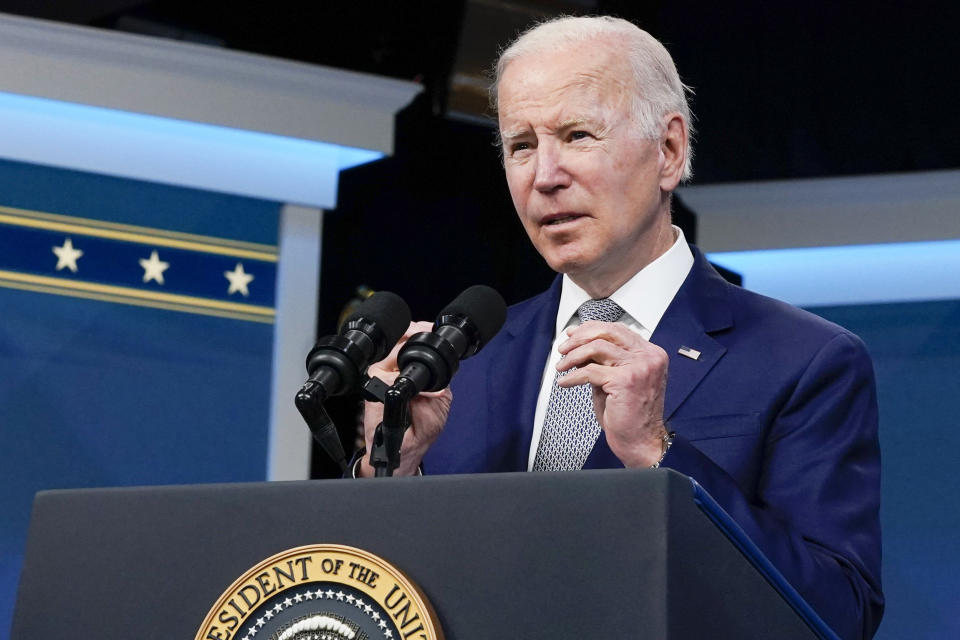White House announces measures to address baby formula shortage

WASHINGTON — The White House announced a series of measures Thursday to address a shortage of baby formula across the U.S. after President Joe Biden met with key retailers and manufacturers.
The steps include an effort to reduce red tape and to speed formula production and to make it easier to import formula from abroad, as well as a plan to crack down on price gouging nationwide.
"We know families are concerned," a senior administration official said on a call with reporters. Biden held a "productive" virtual meeting with the heads of Gerber, Reckitt, Target, Walmart and other companies about increasing supply and availability.
A representative of Enfamil who also attended the meeting said the conversation was "productive."
"We are running our plants 24/7, which has enabled us to increase supply to parents and infants by more than 30% — feeding over 200,000 more babies than at the start of the shortage," a spokesperson for the company said in a statement. "But manufacturing is only one part of the solution, so we will continue to partner with the Administration to identify other ways to help ensure parents and infants have a steady supply of safe, high-quality formula."
The shortage of baby formula, which began in the early days of the coronavirus pandemic, has worsened in recent weeks because of labor shortages and a major product recall, creating panic and anxiety among parents across the country. Some have called the shortage a crisis that has gone on for too long.
White House press secretary Jen Psaki said the White House has been working on the issue "for months." "We're taking every step we can," she said, but "more needs to be done."
In February, the Food and Drug Administration announced that it was investigating certain powdered baby formula made by Abbott Nutrition at a facility in Sturgis, Michigan.
The FDA said it was looking into bacterial infections in four infants who drank the formula produced there. All four babies had to be hospitalized, and the infection "may have contributed to the deaths of two patients," the FDA said.
The agency, which oversees food safety in the U.S., said the infants became ill from Sept. 6 to Jan. 4 in Minnesota, Ohio and Texas. The FDA has urged parents and caregivers not to use recalled Similac, Alimentum and EleCare powdered formulas that were manufactured at the Michigan facility.
Abbott, however, has maintained that it conducted a thorough review, concluding that there is "no evidence" that links their baby formulas to the illnesses of these infants.
The company said in a statement that it tested its products before distribution and none tested positive for Salmonella or the bacteria that infected the babies. The bacteria found in "environmental testing during the investigation was in non-product contact areas of the facility," it added.
Recent data suggest there's no end in sight to the formula shortage. More than 40 percent of baby formula supplies were out of stock across the country in the week that ended Sunday, according to the retail pricing data website Datasembly. "We don’t see this slowing down any time soon," CEO Ben Reich said.
A senior administration official said Thursday that despite the closing of the Abbott facility, more formula has been produced across the country in the past four weeks than during the four weeks before the recall. Asked when consumers would see more formula on shelves, the official said a date couldn’t be given.
Asked about bipartisan calls for Biden to invoke the Defense Production Act to spur formula production, the official said, "We're going to keep every option on the table."
The FDA said in an update this week about steps it was taking to alleviate the shortage that it has "been working tirelessly to address and alleviate supply issues."

Abbott said Wednesday that if it gets government approval, it could resume producing formula at the Michigan facility within two weeks. It said it would then take six to eight weeks more before the product could be in stores.
House Republicans blamed the Biden administration for the shortage Thursday, accusing officials of not doing enough. Rep. Elise Stefanik of New York, their conference chair, said the administration doesn’t have a plan to address the crisis.
"As a new mother, I understand personally the severity of this challenge. My son Sam is 9 months old. He is formula-fed. And even in my trip to the grocery store in upstate New York, the shelves have been fairly empty," Stefanik said at a GOP news conference. "Babies have been put to bed hungry while parents are desperately trying to find alternative formulas that are often difficult to procure. This is not a Third World country. This should never happen in the United States of America."
Rep. Ann Wagner, R-Mo., said the shortage is "purely due to the blatant incompetence in this White House and the Democrats," who she said haven't scheduled a hearing on the issue until the end of May.
Two House Republicans, Randy Feenstra of Iowa and Stephanie Bice of Oklahoma, on Wednesday introduced the Formula Act, which would direct the FDA to establish and communicate clear standards to Congress about how it regulates baby formula. They noted that the U.S. doesn't import infant formula from abroad and said the legislation would allow the U.S. to safely import such products to expand domestic supply.
A version of the proposal was among the measures announced by the White House.

